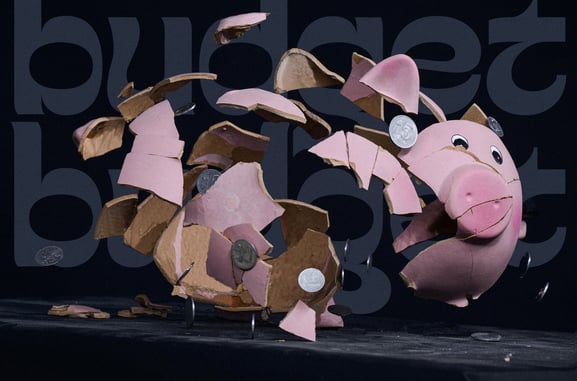
Latest Article: What is a Sovereign Wealth Fund and Why is America Creating One?
How to Create a Budget for Your Creative Business (and Stick to it)
Learn what a budget is, how to create one, and what to include in a budget - all geared toward creative business owners like you. Learn about the best budget apps and the best expense tracking apps on the market right now.
BUSINESSBUDGETINGACCOUNTINGINVESTINGHOMEPAGE - FEATURES - ROW 2
David Kindness, CPA
12/5/2024



How to Create a Budget for Your Creative Business (and How to Stick to it)
Published on December 4, 2024
Written by David Kindness, CPA
Why you can trust Your Creative CPA
Our content is written, edited, or both by industry experts who are creative entrepreneurs just like you. Learn more.
Juggling income and expenses as a freelancer or small business owner can be stressful and confusing. Creating a budget - and sticking to it - is essential for achieving financial stability and reaching your financial and business goals. This guide will walk you through a step-by-step process of how to build a budget, what to include in it, strategies to stick to it, and helpful budgeting tools to automate the process as much as possible.
Fast Facts
A budget is a plan for managing your money that can help you save, grow your business, and reach your financial goals.
Creating a budget involves tracking and strategizing your income and expenses.
Budgeting helps you save money, pay off debt, and invest in things that matter to you and your business.
Technology can make budgeting easier with budgeting apps and tools.
What is a Budget?
A budget is a financial plan that outlines your expected income and expenses over a specific period. It helps you track your spending, identify areas where you can cut back, and save for your goals. By creating and sticking to a budget, you can gain control of your finances and reduce financial stress.
The goal of a budget is to determine the amount of income you receive, the total expenses you incur, and the amount of disposable income you build up over a certain period, like a month, a quarter, or a year. Understanding this info will help you take ownership over your finances and reach your financial goals.
How Do You Create a Budget?
Creating a budget can be simpler than you think. Making a budget involves the following steps:
Track your income: List all sources of income, including income from a regular job, as well as your freelance or business income.
List your expenses: List out all your expenses, like rent or mortgage, utilities, internet, phone bill, car payments, gas or EV charging costs, groceries, etc. If you're creating this budget for your business, exclude personal portions of all expenses, and include business expenses like office supplies, subscriptions, marketing expenses, etc. Tip: reviewing bank statements and credit card bills can help identify all expenses.
Categorize your expenses: once you've tracked down and listed out all your expenses, categorize them into fixed expenses (rent, utilities) and variable expenses (food, entertainment).
Set financial goals: Determine what you want to achieve with your budget, whether it's saving for a down payment, paying off debt, or building an emergency fund.
Allocate your income: Divide your income into categories based on your financial goals and expenses.
Monitor your progress: Regularly review your budget to ensure you're staying on track. Make adjustments as needed.
Creating a budget is an important step in managing and growing your finances.
Sticking to it will help you achieve the financial freedom you dream of.

What Do You Include in a Budget?
Your budget should include both the income you receive from your work or side hustles, as well as all of your expenses. Here's a breakdown of what to include in your budget:
What Income Should You Include in a Budget?
You should include all types of income that you receive in your budget. This can include the following..
Income from your job or career: this can include income from your full-time or part-time job, like hourly wages, an annual salary, bonuses, commissions, and tips.
Freelance or business income: you should also include income earned from a business, freelance work, or a side hustle.
Rental income: If you own a rental property, rent out a building on your property or a room in your house, or Airbnb your home, this income should be included in your budget as well.
Investment income: if you earn dividends, interest, or capital gains from financial investments in stocks, bonds, mutual funds, ETFs, etc, include this in your budget.
Retirement income: if you're old enough (generally age 59½ or older) to take distributions from your retirement account(s), receive pension distributions, or earn Social Security income, then you should include these distributions in your budget.
Other income sources: include income from sources other than those listed above as well.
Income you should not include: you should not include income earned in retirement accounts, like a Traditional IRA, Roth IRA, or others, if you are not taking distributions from those accounts. This is income you'll receive down the road and should only be included then.
If your income fluctuates every month and you'd like to simplify the budget-building process, you can use an average monthly income for each category. That way you only have to update your income when a bigger change - like a raise or business growth - occurs.
What Expenses Should You Include in a Budget?
Similarly to your income, you should include basically all of your recurring expenses in your budget. This can include things like...
Fixed expenses: include expenses that generally do not change from month to month, like your rent or mortgage, utilities, internet, phone, insurance, gym memberships, co-working space, etc.
Variable expenses: include expenses that fluctuate from month to month, like groceries, dining out, transportation, entertainment, travel, etc.
Debt payments: include payments on your debt, like credit student loans, auto loans, mortgages, a line of credit, business loans, or credit card interest.
Taxes: taxes should also be included in your budget if they haven't already been removed from your income via withholdings from your employer.
What Other Items Should You Include in a Budget?
On top of all the expenses you already removed, you should also deduct the following items from your budget.
Savings and investments: while these are not expenses, you should deduct them from your budget because they represent a cash outflow that you aren't using in the short- or mid-term. Instead, savings and investments are designed to help you grow your wealth and save for long-term goals like buying a home, purchasing a vehicle, saving for your kid's college fund, and more.
Retirement account contributions: as with savings and investments, contributions you make to your retirement account(s) should be deducted from your budget. If you open a Roth IRA, for example, all contributions to that account represent a cash outflow from your personal budget.
Best Budgeting Apps for Freelancers and Business Owners
There are a number of budgeting apps, websites, and software downloads on the market to help you track your finances and create a budget. We combed through the available options and found our seven favorites. Learn about them below:
PocketGuard
CreditKarma (formerly Mint)
YNAB (You Need a Budget)
EveryDollar
Personal Capital
How to Stick to Your Budget While Staying Creative
Creating and sticking to a budget is essential for financial success as a freelancer or small business owner. Budgeting allows you to understand your finances today, save for your future, and reach your personal and business goals over time. By following the steps in this article, tracking your income, expenses, and investments, and utilizing budgeting apps and tools, you can gain control of your finances, reduce stress, and achieve your financial goals.
Frequently Asked Questions (FAQs)
How much can I contribute to an IRA in 2024?
The IRA contribution limit for 2024 is $7,000, or $8,000 for those age 50 or older. Make sure you don't go above this limit, as this can result in fines and penalties. If you do go above the limit, you can withdraw the excess to avoid penalties.
What is the difference between a Roth IRA and a Traditional IRA?
The main difference is when you pay taxes. Traditional IRA contributions are tax-deductible, but you pay taxes on withdrawals in retirement. Roth IRA contributions are made with after-tax dollars (so they are not tax-deductible), but qualified withdrawals in retirement are tax-free.
Can I open an IRA if I am self-employed?
Yes! You can open any type of IRA: traditional, Roth, SEP, or SIMPLE. There are even IRAs specifically designed for self-employed individuals, such as SEP IRAs and SIMPLE IRAs, which we dove into above. These IRAs can offer tax advantages for both you and any eligible employees you may have.
What happens to my IRA if I switch jobs?
Your IRA belongs to you, regardless of your employment status. You can leave your IRA with your current provider or roll it over to a new IRA at a different provider.
Can I contribute to both a Traditional IRA and a Roth IRA
Yes, you can contribute to both a Traditional IRA and a Roth IRA, but there are overall contribution limits across both accounts. The contribution limit is $7,000 for 2024 ($8,000 for those 50 or older). Your income may also affect your eligibility to contribute to a Roth IRA.
When can I withdraw money from my IRA?
While you can withdraw money at any time, there is a 10% penalty for withdrawing money from a traditional IRA before reaching the age of 59 ½, with some exceptions for certain qualified expenses. Roth IRA contributions can be withdrawn anytime, tax and penalty-free, but you'll have to pay taxes and a penalty if you withdraw the income earned in your Roth IRA. Traditional IRA withdrawals after age 59 ½ are taxed as income, while Roth IRA withdrawals are tax-free.
Disclaimer: the information provided in this article is for educational purposes only and does not constitute tax, accounting, investing, legal, or financial advice. The information in this article does not take into account your unique financial or business situation or goals, and YCCPA cannot be responsible for reader's financial decision-making. YCCPA's goal is to educate and support you on your creative business journey.
Written by David Kindness, CPA
David is a CPA (Certified Public Accountant) and professional photographer, videographer, and designer based in San Diego, California. Learn more.




supported by ads
Your Creative CPA is supported by the ads you see in our articles and guides.
These ads help us help creatives like you.

financial wisdom for creatives, by creatives
Created by David Kindness
Copyright 2025 Terms






